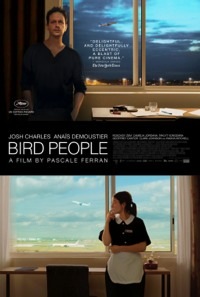Tweets and FaceTimes: Pascale Ferran Returns with Uneven But Adventurous Realist-Fantasy
 There are a number of films scattered throughout that are intent on depicting how our world communicates and operates today, viz. through web-mediated interfaces. But none of them approached this reality, however glancingly, in such an exuberantly abstract register as did Pascale Ferran in her bonkers, wholly original, yet painfully uneven new film, Bird People. It’s her first project since the now eight year-old Lady Chatterley (2006), and one can imagine that at least half of that hiatus was spent working on the film’s CGI effects alone, which are some of the most subtle but meticulous to be employed in any film yet in existence. The only problem is that so much narrative playfulness and structural innovation gets seriously bogged down by Ferran’s awkward direction and a script filled with lame dialogue — perhaps attributable to English being her second language.
There are a number of films scattered throughout that are intent on depicting how our world communicates and operates today, viz. through web-mediated interfaces. But none of them approached this reality, however glancingly, in such an exuberantly abstract register as did Pascale Ferran in her bonkers, wholly original, yet painfully uneven new film, Bird People. It’s her first project since the now eight year-old Lady Chatterley (2006), and one can imagine that at least half of that hiatus was spent working on the film’s CGI effects alone, which are some of the most subtle but meticulous to be employed in any film yet in existence. The only problem is that so much narrative playfulness and structural innovation gets seriously bogged down by Ferran’s awkward direction and a script filled with lame dialogue — perhaps attributable to English being her second language.
Evoking films as disparate as José Luis Guerín’s languid In the City of Sylvia (2007) and Kenneth Lonergan’s erratic and epic Margaret (2011), Bird People opens with a protracted montage showing a broad range of random travellers commuting in and around Paris’ Charles de Gaulle airport on the subway. As we’re shown each person, we’re treated to blips and excerpts of their thoughts caught in medias res, which effectively weaves an elaborate tapestry of lives and plans in the process of being lived and being made, however banal they invariably are. Call it an anachronistic, pre-Twitter moment: a public regressed back to a mode in which they keep everyday thoughts to themselves rather than heaving them out into the world. In this intro, we become witness to the obligations and strictures that delimit man’s freedom to live the life he wants, which will be Ferran’s big theme with this film.
The first subject to embody this vision is Gary (Josh Charles), after whom a title card names this chapter of the film. Gary is an American landed in Paris for some narrowly-defined business trip, and he seems to have an epiphany when, on the ride to his hotel rom from the airport, he sees a smashed car on the side of the highway — a remnant of a recent auto accident that, by the looks of the damage, probably claimed at least one life. The realization that life can end at any unexpected moment creates a rift in Gary’s worldview, and prompts him to compulsively quit his job and tell his wife (with whom he has offspring) that he isn’t coming home to her.
In an excitingly bold move, Ferran has this decision make up the entire first half of her two-hour-plus film. The logistics and ramifications of Gary’s retirement are intensively discussed over numerous phone calls with his boss and colleagues, and his brash break-up with his wife is played out over an all-night Skype call that must bite out about a quarter of the film’s total duration. The attention to detail is invigorating, but, as was mentioned before, the manner in which the scenes are written and delivered leave so much to be desired that it ultimately becomes an endurance test. (Had Lonergan, for example, written the dialogue, handled the casting, and directed these scenes, all while retaining Ferran’s structure and conception, it would not be difficult to imagine the result approaching masterpiece territory.)
From here, the film shifts gears, and a new chapter, “Audrey,” begins. The specifics of this latter half of the film — centred around a maid named Audrey (Anaïs Demoustier) who works at the hotel where Gary is staying — are best revealed and experienced in the act of seeing the film itself. That said, what unfolds is a display of pure, go-for-broke ridiculousness that only a true visionary would even think to realize with this level of commitment.
The film’s dialogue (and, therefore, delivery) problems largely evaporate here, yielding to an hour of filmmaking one can unreservedly get behind. It must be said that despite whatever clunkiness one must wade through to get here, this section of the film is veritable ‘must-see’ stuff. Alas, the end result is a long list of “if only’s,” yet there is enough going right to suggest the great film this so nearly is.
Reviewed on May 22nd – Un Certain Regard – 128 Minutes
★★½/☆☆☆☆☆


